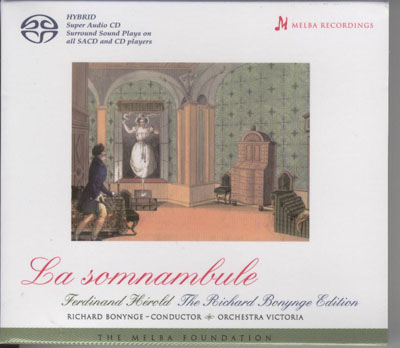

Ferdinand Hérold: La Sonnambule
Orchestra Victoria conducted by Richard Bonynge.
Melba Recordings CD MR 301087
How many of us did believe there was a future for Richard Bonynge after his wife Joan Sutherland retired ? Often when couples use their musical clout to be hired as a pair, this high handed tactic fires back. The moment the big star has left the scene theatre bosses show their resentment. Rina Gigli’s career petered out after Beniamino’s farewell to the important stages of the world even though her voice markedly improved. Julia Varady never had the first rank career she deserved as she willingly became the shield behind which Dieskau hid his humour swings. And Henry Lewis too, after his divorce from Horne, went down the hill. Richard Bonynge knew for sure that his problems would start the moment Sutherland winded down.
Even in her heydays, he was regularly and often unjustly vilified for slack conducting, for having no real talent. Nevertheless for a whole generation it was thanks to Bonynge that commercial recordings of Le Roi de Lahore and Don Quichotte took form and his Esclarmonde is still the only one available. Lovers of romantic ballet music were and are still immensely grateful to him as the Sutherland connection led to Bonynge conducting some wonderful and almost forgotten scores.
Well, remarkably Bonynge bounced back after Sutherland’s retirement. He and his encyclopaedic knowledge of belcanto and French opera was well sought after by later singers like Sumi Jo. He specialized too in the kind of magnificent music which disappearance is the main musical tragedy of the last decades of the 20th century: operetta. He gave us the first complete recording of a once so popular score like Kalman’s Die Herzogin von Chicago. Recently he has been conducting a lot of interesting stuff on what may be safely called his and Sutherland’s own label: Melba Recordings.
The latest addition is the ballet La Sonnambule by Ferdinand Hérold. The composer who tragically died at 41 was once formidably popular due to his two best known operas Zampa and Le-pré-aux-clercs. Collectors have enjoyed the tuneful music due to the underground CD-R exchanges of live performances and most opera lovers would be agreeably surprised to see a production in the flesh. With La Sonnambule Bonynge once more unearths a completely forgotten ballet. The score was never published and the edition under review was discovered in Hérold’s own library.
La Sonnambule indeed treats the same theme as Bellini’s more famous opera (Mr. Bonynge conducted maybe the best overall recording 26 years ago.) though the ballet has older roots as the libretto is by Eugène Scribe, based on this playwright’s own theatre piece. Felice Romani copied it a few years later. “The aim of music is to soothe the nerves and not to excite them” Maria Callas once famously declared and in this La Sonnambule is absolutely worthwhile. It may not be Giselle or Coppélia but it has merit. The ballet (69 minutes) has good tunes, rhythmic vitality and charm and reminds us that once upon a time classical music existed too to pleasure its audiences instead of boring them to death with painful dissonances on pretentious philosophical themes.
Maybe you won’t ponder on the issues of life and death while listening but it is relaxing and enjoyable; a wonderful CD to put into your car player too. As a conductor Mr. Bonynge has no rival to bring out the beauties of such a romantic score: lightness of touch and no matter what critics once wrote rhythmic vitality to spare. One can almost see the smile on the lips of the members of Orchestra Victoria who surely enjoyed themselves during this opportunity to record such an agreeable score. The sleeve notes too are well written and lavishly illustrated. Therefore, keep up the good works Mr. Bonynge.
Jan Neckers, Opera Nostalgia